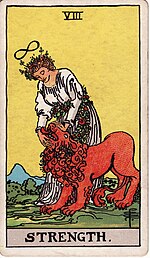
The Major Arcana are the named cards in a cartomantic tarot pack. There are usually 22 such cards in a standard 78-card pack, typically numbered from 0 to 21. Although the cards correspond to the trump cards of a pack used for playing tarot card game, the term 'Major Arcana' is rarely used by players and is typically associated exclusively with use for divination by occultists.

The Rider–Waite Tarot is a widely popular deck for tarot card reading, first published by the Rider Company in 1909, based on the instructions of academic and mystic A. E. Waite and illustrated by Pamela Colman Smith, both members of the Hermetic Order of the Golden Dawn. Also known as the Waite–Smith, Rider–Waite–Smith, or Rider Tarot, the deck has been published in numerous editions and inspired a wide array of variants and imitations. Estimates suggest over 100 million copies of the deck circulate across 20 countries.

The Magician (I), also known as The Magus or The Juggler, is the first trump or Major Arcana card in most traditional tarot decks. It is used in game playing and divination.

The Pictorial Key to the Tarot is a divinatory tarot guide, with text by A. E. Waite and illustrations by Pamela Colman Smith. Published in conjunction with the Rider–Waite tarot deck, the pictorial version followed the success of the deck and Waite's text The Key to the Tarot. Both Waite and Smith were members of the Hermetic Order of the Golden Dawn. Waite was very concerned with the accuracy of the symbols used for the deck, and he did much research into the traditions, interpretations, and history behind the cards.

The Empress (III) is the third trump or Major Arcana card in traditional tarot decks. It is used in card games as well as divination.
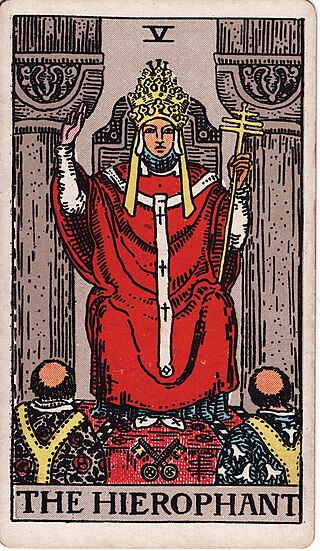
The Hierophant (V), alternatively depicted as The Pope or The High Priest (as a counterpart to "The High Priestess") is the fifth card of the Major Arcana in occult Tarot decks used in divination. It was identified as the Pope in early decks like Tarot of Marseilles, while modern decks like Rider–Waite Tarot may use the term hierophant (Ancient Greek: ἱεροφάντης), a person who brings religious congregants into the presence of that which is deemed "holy".

Death (XIII) is the 13th trump or Major Arcana card in most traditional tarot decks. It is used in tarot card games as well as in divination. The card typically depicts the Grim Reaper, and when used for divination is often interpreted as signifying major changes in a person's life.

The Hanged Man (XII) is the twelfth Major Arcana card in most traditional tarot decks. It is used in game playing as well as in divination.
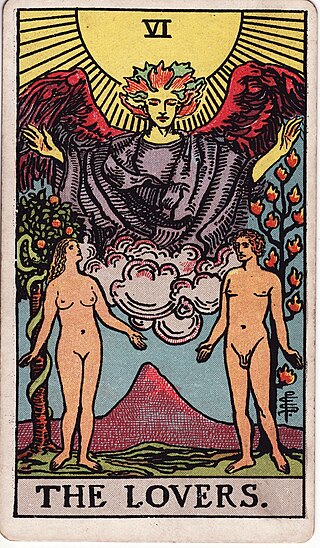
The Lovers (VI) is the sixth trump or Major Arcana card in most traditional Tarot decks. It is used in game playing as well as in divination.

The Chariot (VII) is the seventh trump or Major Arcana card in most traditional tarot decks. It is used in game playing as well as in divination.

The Hermit (IX) is the ninth trump or Major Arcana card in most traditional tarot decks. It is used in game playing as well as in divination.
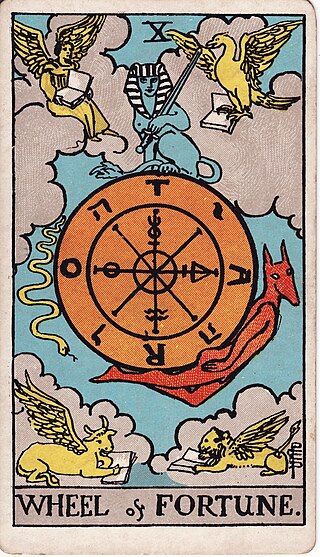
Wheel of Fortune is one of 78 cards in a tarot deck and is the tenth trump or Major Arcana card in most tarot decks. It is used in game playing as well as in divination.

Justice is a Major Arcana tarot card, numbered either VIII or XI, depending on the deck. This card is used in game playing as well as in divination.
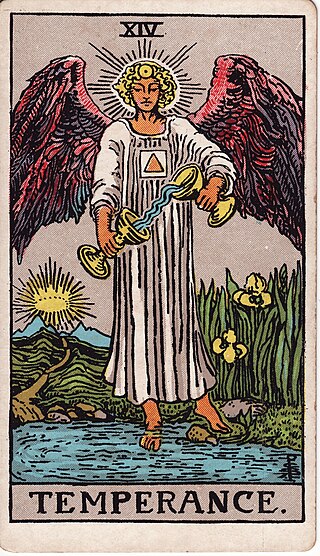
Temperance (XIV) is one of the 22 Major Arcana cards in Tarot decks. It is usually numbered 14. It depicts a figure which represents the virtue Temperance. Along with Justice and Strength, it is one of three Virtues which are given their own cards in traditional tarot. It is used in both game playing and in divination.

The Devil (XV) is the fifteenth trump or Major Arcana card in most traditional tarot decks. It is used in game playing as well as in divination.

The Tower (XVI) (most common modern name) is the 16th trump or Major Arcana card in most Italian-suited tarot decks. It has been used in tarot cards since the 15th century as well as in divination since the mid-19th century.

The Star (XVII) is the 17th ranking or Major Arcana card in most traditional tarot decks. It is used in game playing as well as in divination.

The Moon (XVIII) is the eighteenth trump or Major Arcana card in most traditional tarot decks. It is used in game playing as well as in divination.

The World (XXI) is the 21st trump or Major Arcana card in the tarot deck. It can be incorporated as the final card of the Major Arcana or tarot trump sequence (the first or last optioned as being "The Fool" (0)). It is associated with the 22nd letter of the Hebrew alphabet, 'Tau', also spelled 'Tav' or 'Taw'.

Tarot card reading is a form of cartomancy whereby practitioners use tarot cards to purportedly gain insight into the past, present or future. They formulate a question, then draw cards to interpret them for this end. A traditional tarot deck consists of 78 cards, which can be split into two groups, the Major Arcana and Minor Arcana. French-suited playing cards can also be used; as can any card system with suits assigned to identifiable elements.
